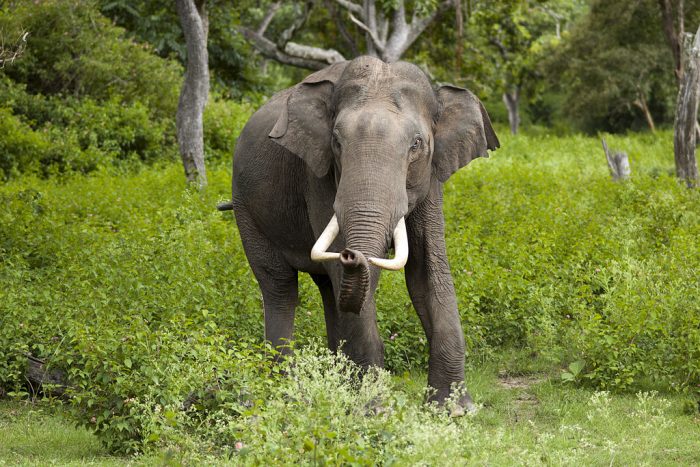Asian Elephants Avoid Bees
For the first time, research has shown that Asian elephants are scared of honey bees. Like their counterparts in Africa, they respond with alarm, a finding that will help resolve conflict between humans and crop-raiding elephants.
 Image: By Yathin S Krishnappa (Own work) [CC BY-SA 3.0 (http://creativecommons.org/licenses/by-sa/3.0)], via Wikimedia Commons
Image: By Yathin S Krishnappa (Own work) [CC BY-SA 3.0 (http://creativecommons.org/licenses/by-sa/3.0)], via Wikimedia Commons For the first time, researchers have shown that Asian elephants in Sri Lanka are scared of honey bees, much like their African counterparts. A new study, published in Current Biology, used playbacks to show that Asian elephants responded with alarm to the bee simulations, retreating from the sound and vocalising. The results could have significant impacts on efforts to resolve human-wildlife conflict in the country by deterring the elephants from crop-raiding.
Playbacks have been used for many years to explore the behavioural responses of African elephants to a suspected natural threat, but the research is the first time this technique has been used to record how Asian elephants react to the sound of bees.
The study, led by Dr Lucy King, a Research Associate with the Oxford University Department of Zoology and head of the Human-Elephant Co-Existence Programme for Save the Elephants, showed that Asian elephants responded with alarm to the bee simulations. They also retreated significantly further away and vocalised more in response to the bee sounds compared to controls.
In collaboration with elephant scientists from Cornell University, Save the Elephants, Trunks and Leaves, Disney’s Animal Kingdom and University of Peradeniya the team now hope that beehive deterrents, used so successfully to ward off African elephants from rural farm lands, can be applied to prevent Asian elephant populations from raiding crops.
Dr King said: “Asia has even higher levels of human-elephant conflict than Africa does and Asian elephants are approximately 10 times more endangered than African elephants. If we could help apply the results from this research to develop effective community-based beehive fence deterrent systems for rural Asian farmers living with elephants, we could have a significant impact on the survival of the Asian elephant species.”
The study was performed in Udawalawe National Park, which has an exceptionally large elephant population. “Udawalawe is a microcosm for the issues Asian elephants face, because it is practically encircled by agriculture and settlements. This study takes the first step in offering a new way of addressing the conflicts that arise as a result,” said Dr. Shermin de Silva, Director of the Udawalawe Elephant Research Project.
In partnership with the Sri Lankan Wildlife Conservation Society and Australia’s Newcastle University, a network of 10 trial beehive fence projects are presently being tested to see if they can reduce human-elephant conflict for rural farms in central Sri Lanka.
“We have a wonderful community of willing farmers there who are helping us understand if beehive fences could work to reduce conflict in this intensely high human-elephant conflict zone,” says Dr King. “Although beehive fences may not completely stop elephant crop-raids the honey bees provide other benefits to the farms in the form of pollination services and a sustainable income from honey and wax products.”
The initiative is already harvesting honey from the beehives and four beekeeping workshops have been held to boost beekeeping knowledge and honey processing skills. Further Asian beehive fence collaborations are being formed with scientists in Thailand, India and Nepal.





Sorry, comments are closed on this post